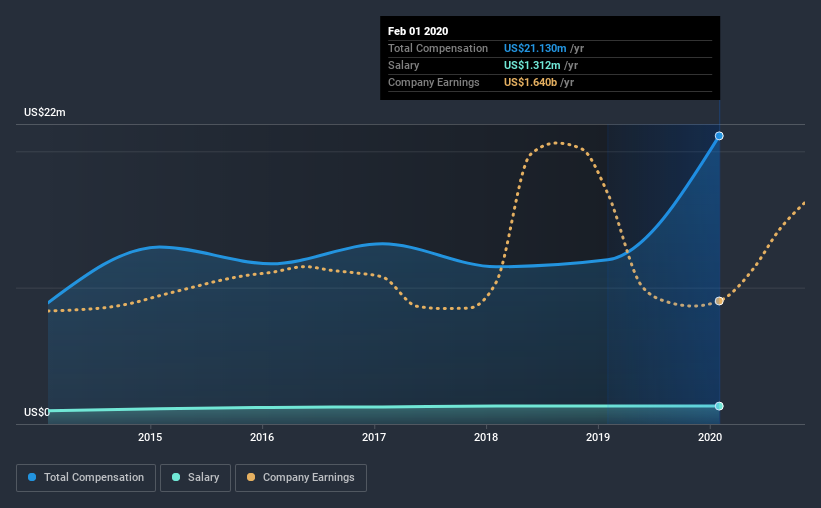A Quick Analysis On Kroger's (NYSE:KR) CEO Salary
This article will reflect on the compensation paid to William McMullen who has served as CEO of The Kroger Co. (NYSE:KR) since 2014. This analysis will also evaluate the appropriateness of CEO compensation when taking into account the earnings and shareholder returns of the company.
Check out our latest analysis for Kroger
Comparing The Kroger Co.'s CEO Compensation With the industry
At the time of writing, our data shows that The Kroger Co. has a market capitalization of US$24b, and reported total annual CEO compensation of US$21m for the year to February 2020. Notably, that's an increase of 76% over the year before. While this analysis focuses on total compensation, it's worth acknowledging that the salary portion is lower, valued at US$1.3m.
In comparison with other companies in the industry with market capitalizations over US$8.0b , the reported median total CEO compensation was US$7.8m. Hence, we can conclude that William McMullen is remunerated higher than the industry median. What's more, William McMullen holds US$94m worth of shares in the company in their own name, indicating that they have a lot of skin in the game.
Component | 2020 | 2019 | Proportion (2020) |
Salary | US$1.3m | US$1.3m | 6% |
Other | US$20m | US$11m | 94% |
Total Compensation | US$21m | US$12m | 100% |
Speaking on an industry level, nearly 16% of total compensation represents salary, while the remainder of 84% is other remuneration. It's interesting to note that Kroger allocates a smaller portion of compensation to salary in comparison to the broader industry. If non-salary compensation dominates total pay, it's an indicator that the executive's salary is tied to company performance.
The Kroger Co.'s Growth
Over the past three years, The Kroger Co. has seen its earnings per share (EPS) grow by 30% per year. It achieved revenue growth of 7.4% over the last year.
Shareholders would be glad to know that the company has improved itself over the last few years. It's good to see a bit of revenue growth, as this suggests the business is able to grow sustainably. Historical performance can sometimes be a good indicator on what's coming up next but if you want to peer into the company's future you might be interested in this free visualization of analyst forecasts.
Has The Kroger Co. Been A Good Investment?
The Kroger Co. has served shareholders reasonably well, with a total return of 20% over three years. But they would probably prefer not to see CEO compensation far in excess of the median.
To Conclude...
As we noted earlier, Kroger pays its CEO higher than the norm for similar-sized companies belonging to the same industry. However, the EPS growth over three years is certainly impressive. We also note that, over the same time frame, shareholder returns haven't been bad. While it may be worth researching further, we don't see a problem with the high CEO pay, given the good EPS growth.
It is always advisable to analyse CEO pay, along with performing a thorough analysis of the company's key performance areas. That's why we did our research, and identified 4 warning signs for Kroger (of which 1 is significant!) that you should know about in order to have a holistic understanding of the stock.
Arguably, business quality is much more important than CEO compensation levels. So check out this free list of interesting companies that have HIGH return on equity and low debt.
This article by Simply Wall St is general in nature. It does not constitute a recommendation to buy or sell any stock, and does not take account of your objectives, or your financial situation. We aim to bring you long-term focused analysis driven by fundamental data. Note that our analysis may not factor in the latest price-sensitive company announcements or qualitative material. Simply Wall St has no position in any stocks mentioned.
Have feedback on this article? Concerned about the content? Get in touch with us directly. Alternatively, email editorial-team (at) simplywallst.com.

